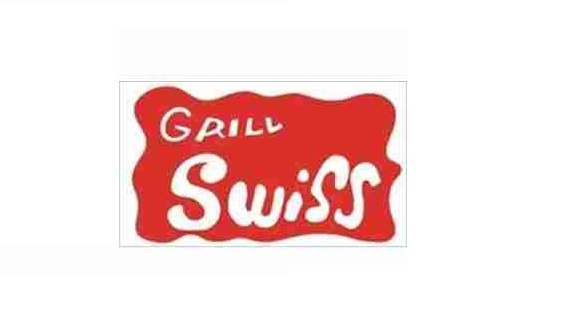The Opposition Board of Japan Patent Office (JPO) decided Trademark Registration no. 6372876 for the “GRILL Swiss” mark would be unlikely to mislead consumers as to the quality of goods in class 30 even when used on non-Swiss confectionary.[Opposition case no. 2021-900258, Gazette issue date: July 29, 2022]
Opposed mark
Opposed mark, outlined letters of “GRILL Swiss” on a red background, was applied for use on various goods and services in classes 29, 30, and 43 without any geographical restriction of the origin of respective goods and services on April 9, 2019, by Ginza Grill.

The opposed mark has been used on a Western food restaurant in Ginza, Tokyo since 1947.
The JPO granted protection of the mark and published for opposition on April 27, 2021.
Opposition by Choco Swiss
Choco Swiss filed an opposition against the “GRILL Swiss” mark in contravention of Article 4(1)(xvi) of the Trademark Law.
Article 4(1)(xvi) is a provision to prohibit the registration of a trademark that is likely to mislead as to the quality of the goods or services.
The Trademark Examination Guideline (TEG) provides an example that the “SWISSTEX” mark for use on watches shall be unregistrable based on the article. It should be noted that the mark can be registered in the event that the goods are amended to Swiss-made watches.
Opponents claimed the opposed mark “GRILL Swiss” caused a misunderstanding of the quality of following goods in class 30 when used on non-Swiss foods.
Aromatic preparations for food, not from essential oils; Tea; Coffee [roasted, powdered, granulated, or in drinks]; Prepared coffee and coffee-based beverages; Cocoa [roasted, powdered, granulated, or in drinks]; Prepared cocoa and cocoa-based beverages; Ice; Confectionery; Bread and buns; Sandwiches; Steamed buns stuffed with minced meat [Chuka-manjuh]; Hamburgers [sandwiches]; Pizzas; Hot dog sandwiches; Meat pies; Seasonings [other than spices]; Spices; Unroasted coffee beans; Cereal preparations; Chocolate spread; Chinese stuffed dumplings [Gyoza, cooked]; Chinese steamed dumplings [Shumai, cooked]; Sushi; Fried balls of batter mix with small pieces of octopus [Takoyaki]; Boxed lunches consisting of rice, with added meat, fish or vegetables; Ravioli; Cooked rice; Cooked curry rice; Cooked curry rice with fried pork, rice with hashed meat; omelet with a filling of ketchup‐seasoned fried rice; Instant confectionery mixes; Pasta sauce; Husked rice; Husked oats; Husked barley; Gluten for food; Flour.
Opponents argued the opposed mark uses the word “Swiss” in a prominent manner, which indicates Switzerland. Besides, the white-outlined letters on a red background give consumers an impression of Switzerland because of the same color as the Swiss flag. Therefore, if the opposed mark is used on non-Swiss foods including Swiss confectionary, a famous origin of chocolate, relevant consumers would inevitably misunderstand as if the goods bearing the opposed mark were originally manufactured and sold in Switzerland.
JPO Decision
The Opposition Board found both words “GRILL” and “Swiss” are less distinctive as a source indicator in relation to the goods in question equivalently. Being that the term “GRILL Swiss” would not give rise to any specific meaning, the Board held the literal element of the opposed mark is a coined word. If so, it is unlikely that relevant consumers consider the word “SwiSS” of the opposed mark as an indication to represent a specific quality of the goods including confectionery.
Based on the above findings, the Board decided the opposed mark contains a coined word within the red device and it would not represent the quality (place of production, place of sale, etc.) of the goods in question. If so, the opposed mark shall not be canceled in contravention of Article 4(1)(xvi) and remains valid as the status quo.
 Masaki MIKAMI, Attorney at IP Law – Founder of MARKS IP LAW FIRM
Masaki MIKAMI, Attorney at IP Law – Founder of MARKS IP LAW FIRM

